CLIMATE TALKS
COP28’s ‘fired-up’ photographer changes the focus to highlight the ‘beauty’ of negotiations
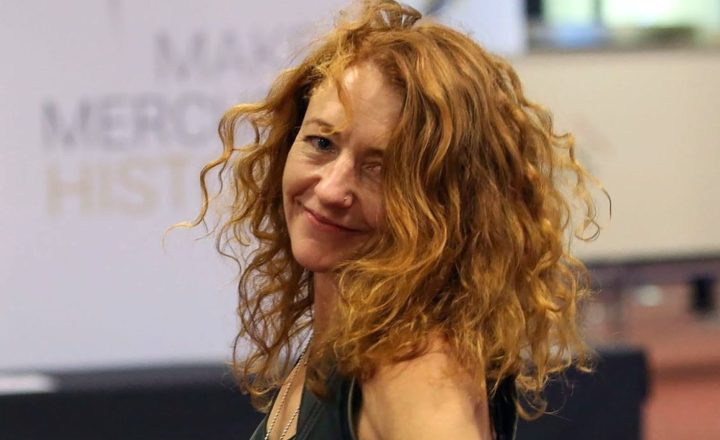
As the photographer you are an observer. You’re observing not just the negotiations, but the people, the place, the dynamics.
It’s rare to hear someone refer to climate negotiations as a thing of beauty, and a giveaway that one is dealing with an irrepressible optimist.
That’s Kiara Worth for you, official photographer for the United Nations Framework Convention on Climate Change at COP28, which kicked off in Dubai on 30 November.
“It’ll be wild. This one in particular will be wild,” she says of COP28, with the relish of someone who thrives on the excitement. “It’s going to be huge, because the UAE is hosting it and pushing it hard. It will be bigger than normal. And the negotiations are tough this year. The political context adds to that: being in the UAE, Palestine – it will be very interesting”.
Two of the big items on the agenda are the first Global Stocktake, which will indicate how effective countries have been to keep the world within 1.5°C of pre-industrial levels, and the Loss and Damage Fund to direct money from the big-emissions developed countries to developing countries which are bearing the brunt of the escalating cycles of extreme weather.
Photography was not the career path Worth had envisaged for herself.
Born and raised in Mafikeng, in the old Bophuthatswana, Worth says her parents worked in agriculture and education and development, “so we moved around a lot as kids”. After completing high school in Nelspruit, she went backpacking for a couple of years through East Africa, before moving to Howick to attend university at UKZN in Pietermaritzburg, where she studied development, politics and theatre.
“After grad I got involved in development work, doing interesting stuff in food security strategies, climate change adaptation, using theatre and the arts to better communicate about climate change adaptation in peri-urban areas in Durban,” she says.
From there, the world opened up to her. The company she worked for got a big contract in Papua New Guinea, to design and implement a series of development strategies focused on agriculture, education, community resilience, women’s empowerment and other development areas.
“I fell in love with Papua New Guinea. It was crazy, and I could entertain you for hours with my stories from there. For the first two years I worked on designing and setting up those projects, but once they were in motion, I started documenting the outcomes of those projects through photography and writing, mainly for internal project reporting. I realised I had some kind of a knack for telling these development stories, and so I started to put together publications about the work we were doing and unpacking key development issues.
“That work got me noticed by the UN. I was on their radar because I had previously volunteered as the global youth coordinator for the Rio+20 process back in 2012, so they had known work as a youth delegate. Around 2014 so they started seeing my more photojournalism work and asked if I wanted to come and document the international negotiation process.
“I never trained in photography, and I’m still blown away that I’m a photographer.”
Role as an observer
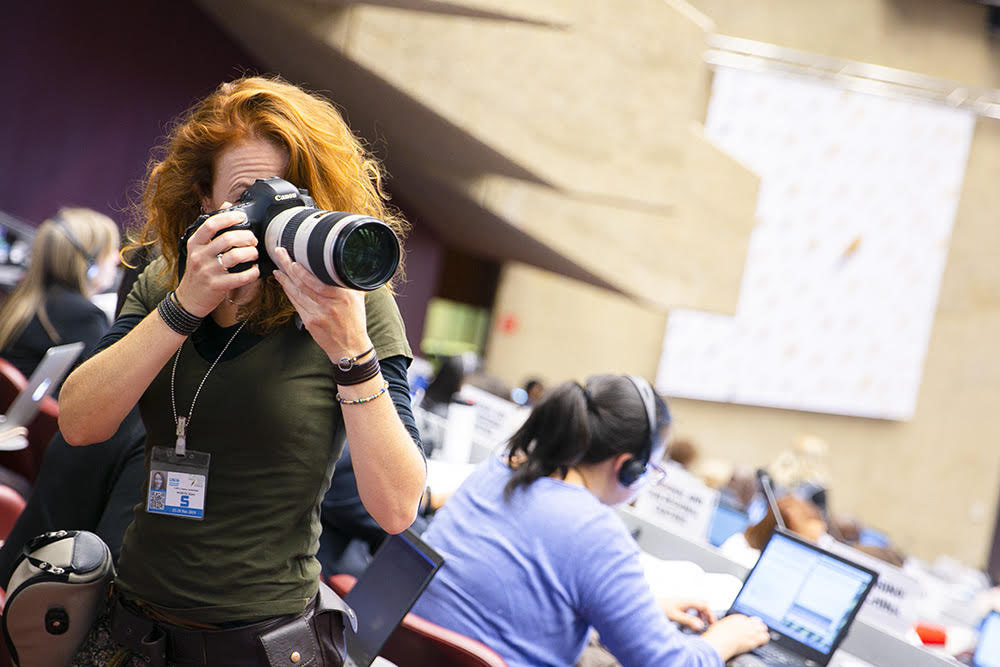
Photographer Kiara Worth in action. She believes her photography helps participants in the COP negotiations see the bigger picture. (Photo: Supplied)
Given her background in activism and in participating in events, how has she adapted to her role as an observer?
“It’s taken me a long time to figure this out,” she says. “Obviously, as the photographer you are an observer. You’re observing not just the negotiations, but the people, the place, the dynamics. But that is influenced by your understanding of the process itself. Because I actually follow the negotiations, I know who and what to look for. So when I see certain people are meeting, I know that’s an important photo to take because I’m familiar with the process itself. The more I engage at that level and publish work that speaks to those kind of stories, I think it changes the way that participants both see themselves and others and how they engage in the process.
“And that actually influences the process itself. It gives us an opportunity to see things in a different way; to see perhaps the more human side of the negotiators, the beauty of the negotiations, the personal dynamics that things rest on. And photography does that. In this magical way it kind of brings the delegates together to focus on something much bigger than just their country positions, but the bigger story of who we are and why we’re here. And that’s what I love.”
It’s not often one hears of negotiations being referred to as beautiful, but Worth laughs when this is pointed out. “Are you kidding? Imagine this dynamic. You have the whole world coming together and discussing issues that are important to everybody. And you get to witness these moments of cultural, intellectual and political exchanges between literally every country in the world. Amazing, right? If you have any interest in human ethnography, it’s just a melting pot of everything.”
But Worth does not view the gathering as a feelgood event, but a performance of power. “The core issue which the whole world faces is this total imbalance of power, that those in power control all the resources and all the means of decision making. To rise above that, and to fight against it, is extremely difficult”.
She developed her insights into how power works doing her PhD, which was on how the fishing company Oceana was polluting Hout Bay and how it eventually conceded. Worth was an activist against its destructive environmental and social role, and saw how conflict between political parties, provincial and national government, and rich and poor made resolution of the issue difficult.
If power is such an immovable force, what does she think the odds are of the South African delegation getting a good deal for Africa out of the big global players?
“What does it mean ‘for Africa’?” she retorts.
“We definitely need to sort out the Loss and Damage Fund. Whether that’s going to happen, we’ll see. There’s huge lack of trust. We haven’t even met our previous finance targets, so who’s to say this one is going to be filled.? Maybe the Presidency will push it forward. But I think it’s all pretty much up in the air.
“The negotiations will be difficult because no one wants to make the hard decisions. No one really wants to say, ‘OK guys, we get it, we did this wrong, we’re going to change and this is how we’re going to do it, and we’re going to sacrifice a little bit of our money and our power in order to restore some form of balance in the world’. No one is willing to do it.”
Stakes are getting higher

Kiara Worth’s photograph of US secretary of state John Kerry and UN secretary-general Ban Ki-Moon as they negotiate the terms of the Paris Agreement at COP21. It was Worth’s first photo to be published in the New York Times. (Photo: Kiara Worth)
“The stakes are getting higher,” she notes. “The only reason we were able to establish the Loss and Damage fund at COP27 in Egypt was because of the devastating floods in Pakistan. They were the epitome of what loss and damage is, and so Pakistan was able to come to the negotiations in full force and say, ‘This is it, this is why we need a fund’. And every year, these decisions are getting much more pertinent. We see countries holding other countries to ransom because of their own interests and not being able to agree on mitigation, for example. And these are the most basic elements of the Paris Agreement [on climate change mitigation, adaptation and finance adopted in 2015]”.
She acknowledges that although the negotiations are critically important, they are often opaque. “People don’t understand the hierarchy of global law and policy making,” she says. Moreover, “it’s like we’re in this little club of decision makers and negotiators and we talk to ourselves in this whole language that’s completely inaccessible to the public. Even within it, it’s hard to follow – climate change is a complex issue”.
“But I feel I can play a particularly interesting role to help break down these barriers. Every day of the negotiations, I write a daily post on Instagram [@kiara_worth] that explains a key topic and shares my top 10 photos of the day. I feel these posts help to inform the broader public of why we’re here, what’s important for you to know – whether it’s loss and damage or the new finance goal – and why should it matter to you. I also add some of my own reflections and experiences, and by making it a personal reflection, it creates an opportunity to educate more broadly and to effect greater change.”
Worth says she stays motivated partly because of the three core principles of her Bahá’í faith: the equality of all humankind; the progression of religions, “that various truths come at different times throughout the history of mankind to guide us constantly towards this more spiritual nature of ourselves”; and that “there is one greater spiritual essence to which we are all connected”.
Day-to-day, that means “I’m really into the practice of virtues. That’s what’s been lost in the world, whether it’s how we engage with each other, how we run business, or how we start wars.. We’ve just lost touch with this humanity within ourselves. How can we bring that back? How can we practise compassion, equity, courage? I try to focus on those every day. I have a big pack of virtue cards, and I pull one out every day. Today’s was Serenity, which I was grateful for.”
As for taking time out, Worth says: “Taking time ‘off’ is a hard thing for me – so much of my life and work is intertwined that you’re never really ‘off’. But I find a lot of release through fire dancing (or poi). I try to do it as much as possible, and when I’m in Cape Town, all the fire dancers meet up on the beach for a fire jam once a month. But I travel with my poi too. I’ll definitely be bringing them with me to Dubai … just not the fire ones!”
There will clearly be enough fireworks on the agenda. DM
Yves Vanderhaeghen is a member of the Oppenheimer Generations Research and Conservation delegation attending COP28 in Dubai. He is strategic consultant and writer for Jive Media Africa, research and communication partner to OGRC.







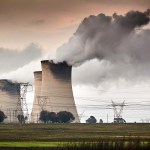

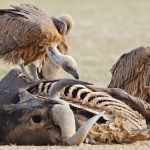
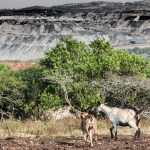










Comments - Please login in order to comment.